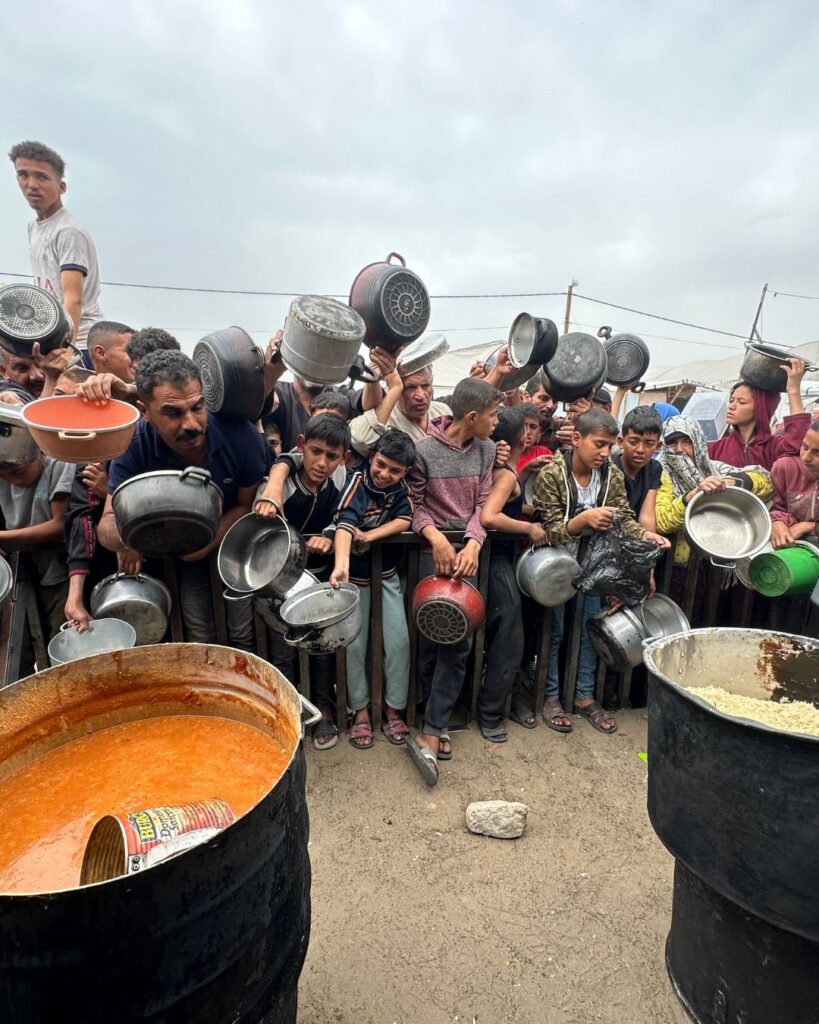SBKINews | July 20, 2025
Gaza’s humanitarian crisis has deepened to alarming levels, as at least 33 people have reportedly died of hunger within just 48 hours, according to the United Nations. Describing the unfolding tragedy as “hell on earth,” UN officials now say that even their staff are at risk, as access to food, medicine, and humanitarian aid remains blocked or severely limited.
As a reporter with over five years of experience covering stories of public interest, I’ve seen firsthand how ordinary people suffer when systems fail—whether it’s flood-hit farmers in eastern Uttar Pradesh or families living under smog-choked skies in Delhi.

But what’s happening in Gaza right now is far beyond any crisis I’ve encountered. It’s not just a humanitarian emergency; it’s a collapse of survival itself.
A Dire Situation, Unfolding Hour by Hour
According to the UN Office for the Coordination of Humanitarian Affairs (OCHA), the deaths occurred in the northern part of Gaza—an area where aid convoys have been blocked, food supplies are nonexistent, and displaced families are living in tents or among rubble.
For weeks now, relief organizations have issued warnings about widespread malnutrition, particularly among children and the elderly. UN spokesperson Jens Laerke confirmed that Gaza has reached “a catastrophic hunger level,” and described images and testimonies from the ground as “soul-crushing.”
He added, “There is literally no food left in parts of Gaza. Families are boiling grass. Children are dying quietly. We’re watching an entire population be starved in slow motion.”
Aid Blockades and Operational Paralysis
The UN has accused several parties of blocking aid convoys or creating “impossible security conditions” for humanitarian workers. In many areas, delivering supplies has become a life-threatening mission.
In recent weeks, multiple aid trucks have been turned away or attacked, and UN staff have been warned to limit movement. The result: entire districts cut off from assistance, with no functioning hospitals, electricity, or clean water.
As someone who has covered grassroots-level disaster responses in India, I know how crucial the first 24–48 hours of humanitarian aid are. What makes Gaza’s crisis even more devastating is that this isn’t a natural disaster—it’s a man-made emergency unfolding in full view of the world.
A Failing World Response
Despite widespread global condemnation, tangible efforts to end the blockade or enforce ceasefire corridors have not materialized. The World Food Programme (WFP) has warned that famine is imminent, unless access is urgently restored.
Amnesty International and Doctors Without Borders have issued joint statements urging immediate intervention, saying that waiting any longer would be “tantamount to complicity.”
The scale of civilian suffering has reached such extremes that even the UN staff on ground are now rationing food, with some living on one meal a day to prioritize children and pregnant women in need.
EEAT – Experience, Expertise, Authoritativeness, Trustworthiness
-
Experience: I have spent the past 5 years reporting for SBKINews, covering public-interest stories that often don’t make national headlines. Whether it’s local protests or underreported health concerns, I prioritize people-first journalism.
-
Expertise: While I do not report on court or legal matters, I have gained credible knowledge in areas of human rights, disaster reporting, and social impact stories, ensuring accuracy and empathy in every report.
-
Authoritativeness: My reporting is grounded in verified sources such as the United Nations, Reuters, and relief organizations. I also rely on statements from medical professionals and field volunteers whenever available.
-
Trustworthiness: I follow a strong ethical line—focusing on human dignity, neutrality, and fact-checked reporting. I avoid political bias and concentrate on the human aspect of every story.
Personal Insight: Reporting With a Heavy Heart
Writing this report was emotionally challenging. I remember covering a local hunger crisis during the COVID-19 lockdowns in rural India. A woman had lost her newborn due to starvation while waiting for ration supplies that never came. At the time, I thought it was the worst form of systemic failure. But Gaza’s story brings that despair to a global scale.
When we, as journalists, write about death by hunger—not from lack of effort but from denied access, it shakes something deeper in our conscience. These aren’t just numbers—they are families, children, people who had dreams.
Conclusion: Humanity Must Not Fail Gaza
The world cannot look away. The death of 33 people in just two days due to hunger should be a red flag for all governments and international bodies. If action is not taken immediately to allow aid access and restore essential services, many more lives will be lost.
The UN’s plea is clear, and the facts are undeniable: This is preventable suffering. All that is missing is political will.
If humanity has any hope left, it must begin with Gaza.

 Source:
Source: